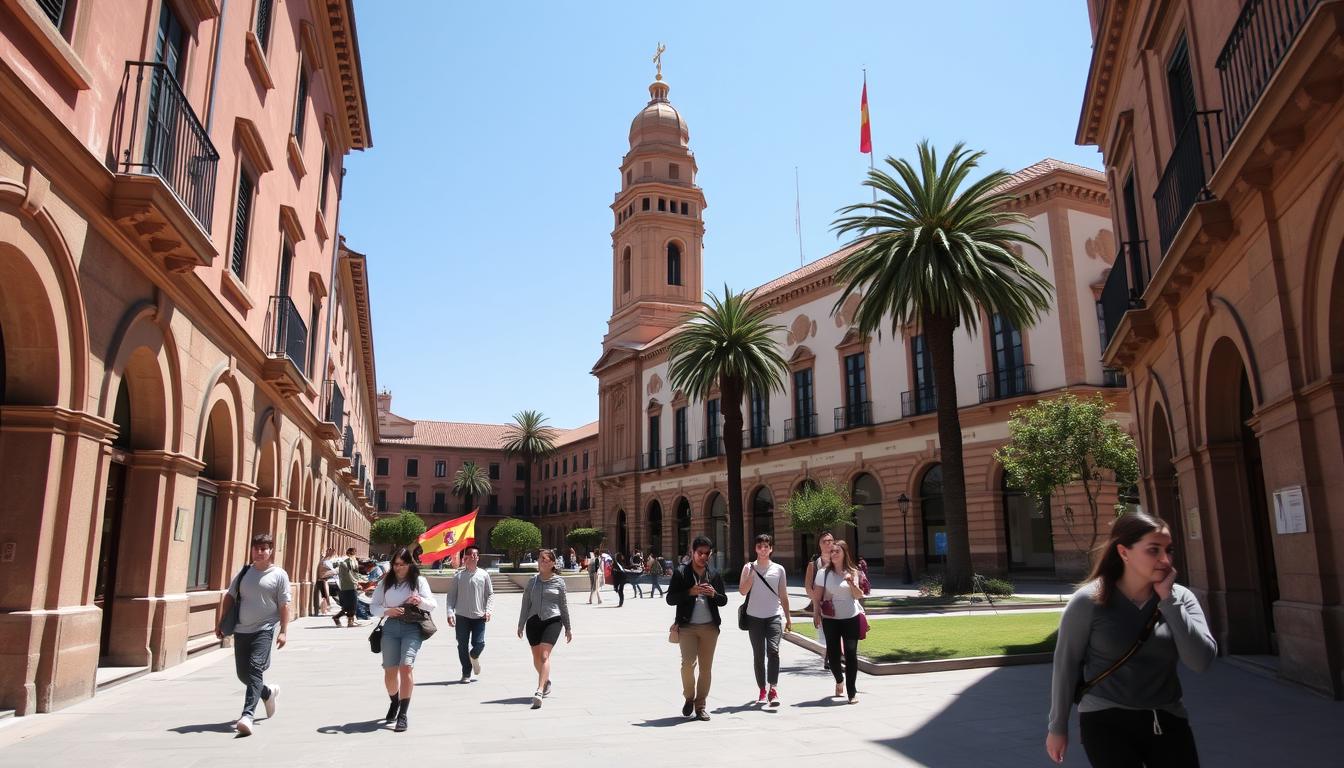Admission Requirements for Spanish Universities
Before applying for a Spain study visa, you must first secure admission to a Spanish educational institution. The admission requirements vary depending on the level of study and the specific university, but generally include the following documents:
- Completed application form from your chosen Spanish university
- Academic transcripts and certificates (apostilled and translated to Spanish)
- Proof of language proficiency (Spanish or English, depending on the program)
- Copy of your passport (valid for at least the duration of your studies)
- Motivation letter explaining your interest in the program
- Letters of recommendation from academic or professional references
- Curriculum Vitae (CV) detailing your academic and professional background
Language Proficiency Requirements
Most Spanish universities require proof of language proficiency, especially for programs taught in Spanish. The most commonly accepted Spanish language certificates are:
| Certificate | Required Level | Validity | Cost |
| DELE (Diploma de Español como Lengua Extranjera) | B2 for undergraduate, C1 for graduate programs | Lifetime | €160-€220 |
| SIELE (Servicio Internacional de Evaluación de la Lengua Española) | B2-C1 (depending on program) | 5 years | €155 |
| CELU (Certificado de Español: Lengua y Uso) | Intermediate-Advanced | Lifetime | €90 |
For programs taught in English, universities typically accept TOEFL (minimum 80-90), IELTS (minimum 6.5), or Cambridge English certificates (CAE or CPE).

University Application Process
The application process for Spanish universities typically follows these steps:
- Research and select Spanish universities and programs that match your academic interests
- Check specific admission requirements and deadlines for your chosen programs
- Prepare and translate all required documents (with official translations)
- Submit your application through the university’s online portal or via email
- Pay the application fee (typically €30-€50)
- Wait for the admission decision (usually takes 4-8 weeks)
- Upon acceptance, receive an official admission letter needed for your visa application
Need help with your university application?
Get our free Spanish University Application Checklist to ensure you don’t miss any critical documents or deadlines.
Spain Student Visa Process: Types, Requirements & Application
Once you have received your acceptance letter from a Spanish educational institution, you can begin the student visa application process. The type of visa you need depends on the duration of your study program.
Types of Spanish Student Visas
Schengen Student Visa (Type C)
For study programs less than 90 days
- Short-term courses or summer programs
- No extension possible
- No residence card required
Short-Term Student Visa (Type D)
For study programs between 90-180 days
- Language courses or semester programs
- Cannot be extended
- Includes NIE (Foreigner Identity Number)
Long-Term Student Visa (Type D)
For study programs exceeding 180 days
- Degree programs or year-long courses
- Renewable annually
- Requires TIE (Foreigner Identity Card) application
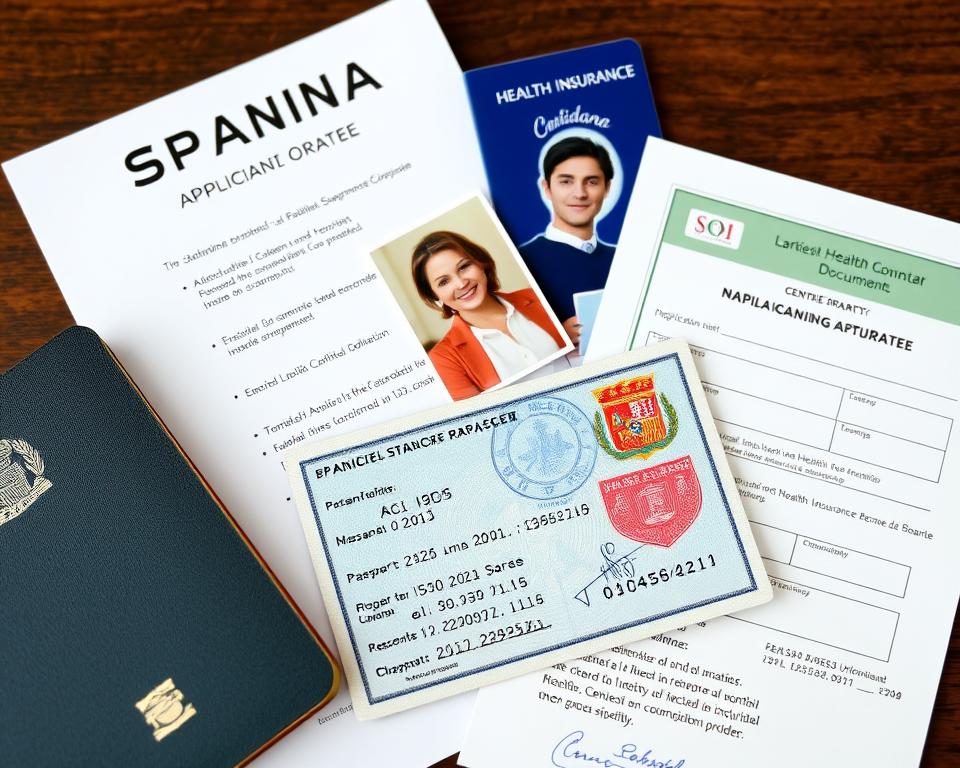
Spain Student Visa Requirements
The following documents are typically required for a Spain student visa application:
- Completed visa application form (National Visa Application Form)
- Valid passport (with at least one year validity beyond your intended stay)
- Two recent passport-sized photographs (white background)
- Official acceptance letter from a Spanish educational institution
- Proof of financial means (minimum €900 per month or €10,800 per year)
- Comprehensive health insurance with coverage in Spain (minimum €30,000)
- Medical certificate confirming you don’t have any diseases requiring quarantine
- Criminal record certificate from countries where you’ve lived in the past 5 years
- Proof of accommodation for at least the first month of your stay
- Visa application fee payment receipt (approximately €80)
Important: All documents must be translated into Spanish by a sworn translator and legalized with an Apostille stamp or through the Spanish consulate in your country.
Financial Requirements for Spain Student Visa
One of the most critical requirements for a Spain student visa is proving you have sufficient financial resources to support yourself during your studies. As of 2023, you must demonstrate access to at least €900 per month (€10,800 per year).
Acceptable proof of financial means includes:
- Bank statements showing sufficient funds (at least 3 months of history)
- Scholarship award letter specifying the monthly or annual amount
- Sponsorship letter from parents/guardians with their bank statements
- Combination of the above sources totaling the minimum required amount
Worried about your Spain student visa application?
Get expert guidance on preparing your financial documents and increasing your visa approval chances.
Step-by-Step Visa Application Process
- Schedule an appointment at the Spanish embassy or consulate in your country
- Gather and prepare all required documents (originals and copies)
- Complete the visa application form with accurate information
- Pay the visa application fee
- Attend your visa interview with all documentation
- Wait for the visa processing (typically 15-30 days)
- Collect your passport with the visa (if approved)
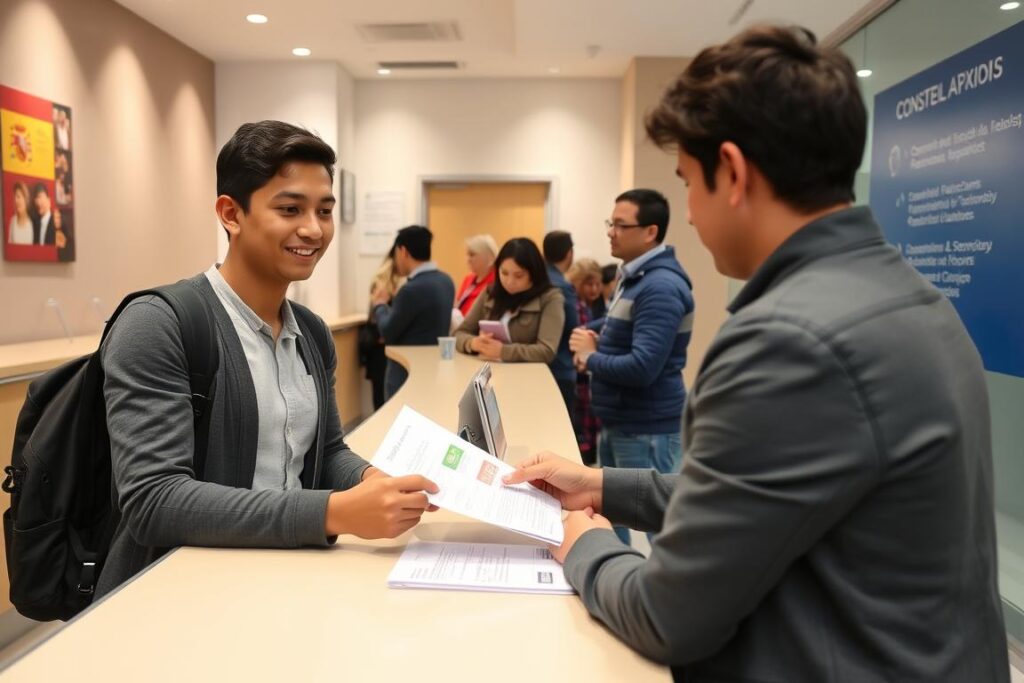
After Arrival: TIE Application
If you have a long-term student visa (over 180 days), you must apply for a TIE (Tarjeta de Identidad de Extranjero or Foreigner Identity Card) within 30 days of arriving in Spain. This card serves as your official identification and residence permit during your studies.
To apply for a TIE, you’ll need:
- Completed EX-17 form
- Passport with visa stamp
- Copy of your acceptance letter
- Proof of payment of the TIE fee (around €16)
- Proof of registration at your local city hall (empadronamiento)
- Three passport-sized photographs
Scholarships and Financial Aid for International Students in Spain
Spain offers various scholarship opportunities for international students to help finance their studies. Here are some of the most prominent scholarship programs:
Erasmus+ Scholarships
The European Union’s flagship education program offers scholarships for students from EU and partner countries to study in Spain.
- Covers tuition, travel, and living expenses
- Monthly stipend of €800-€900
- Application through home university
MAEC-AECID Scholarships
Offered by the Spanish Ministry of Foreign Affairs and Cooperation for students from specific countries.
- Covers tuition, monthly allowance, health insurance
- Monthly stipend of €1,200
- Priority for Latin American, African, and Asian students
Carolina Foundation Scholarships
Targets students from Latin American countries for postgraduate studies in Spain.
- Covers tuition, travel, accommodation, and monthly allowance
- Approximately 500 scholarships awarded annually
- Competitive selection process based on academic merit
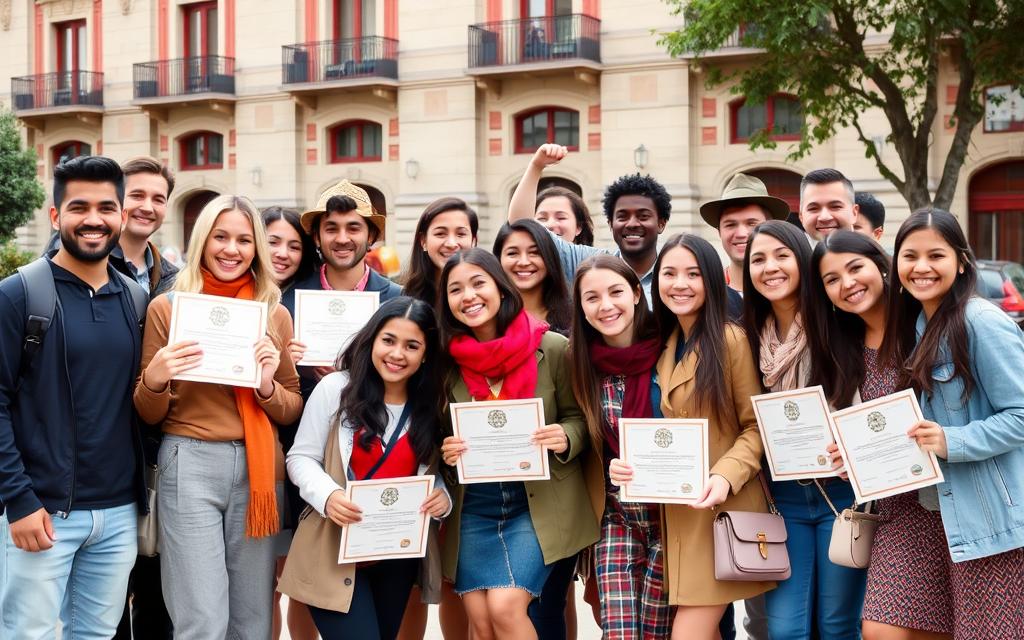
University-Specific Scholarships
Many Spanish universities offer their own scholarships for international students based on academic merit, financial need, or specific talents. Some notable examples include:
| University | Scholarship Name | Amount | Eligibility |
| Universidad Complutense de Madrid | UCM International Excellence Scholarship | Full tuition waiver | Top academic performers with GPA ≥ 9/10 |
| Universidad de Barcelona | UB International Students Grants | €1,000-€3,000 | Based on academic merit and financial need |
| IE University | IE Foundation Scholarships | Up to 40% of tuition | Academic excellence and leadership potential |
Scholarship Application Tips
Scholarship Application Do’s
- Apply early (at least 6-12 months before your program starts)
- Carefully read eligibility requirements and deadlines
- Prepare a compelling personal statement highlighting your achievements
- Secure strong recommendation letters from professors/employers
- Submit all required documents in the specified format
Scholarship Application Don’ts
- Submit generic applications without customization
- Miss application deadlines
- Neglect to follow specific formatting instructions
- Provide incomplete documentation
- Apply only for one scholarship (diversify your applications)
University Fee Structure in Spain
Tuition fees in Spain vary depending on whether you attend a public or private university, your level of study, and the region where the university is located. Generally, Spain offers more affordable education compared to many other European countries.
Public vs. Private Universities
| Type | Undergraduate (per year) | Master’s (per year) | PhD (per year) |
| Public Universities | €750-€2,500 | €1,500-€4,000 | €400-€1,200 |
| Private Universities | €5,000-€18,000 | €6,000-€20,000 | €5,000-€12,000 |
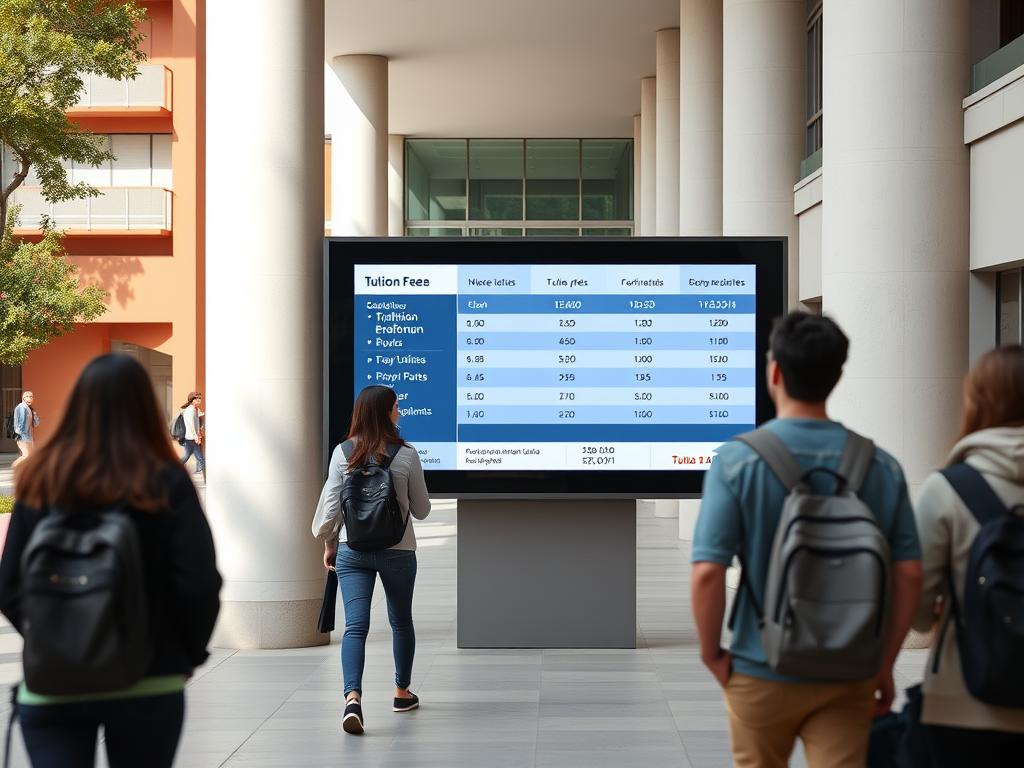
Regional Variations in Tuition Fees
Spain’s autonomous communities (regions) have some flexibility in setting tuition fees for public universities, resulting in regional variations:
| Region | Average Undergraduate Fees (per year) | Notes |
| Catalonia | €1,500-€2,500 | Higher than national average |
| Madrid | €1,200-€2,000 | Moderate fees with many scholarship options |
| Andalusia | €750-€1,500 | More affordable than other regions |
| Galicia | €800-€1,300 | Lower cost of living compensates for fees |
Additional Costs to Consider
Beyond tuition fees, international students should budget for these additional expenses:
- Accommodation: €300-€600 per month (shared apartment), €500-€900 per month (university residence)
- Food: €200-€300 per month
- Transportation: €30-€60 per month (student discount available)
- Health Insurance: €300-€800 per year
- Books and Supplies: €300-€400 per year
- Personal Expenses: €200-€300 per month
Cost-Saving Tip: Many Spanish universities offer installment payment plans for tuition fees. Additionally, international students can often access the same discounts as local students for transportation, museums, and cultural activities by showing their student ID.
Part-Time Work Options for International Students
International students in Spain are permitted to work part-time while studying, which can help offset living expenses. However, there are specific regulations you must follow.
Work Regulations for Student Visa Holders
- You can work up to 20 hours per week during the academic term
- Full-time work is permitted during official holiday periods
- Your work schedule must be compatible with your study schedule
- For student visas issued after August 2022, no additional work permit is required
- For older visas, your employer must apply for a work authorization
- Income from part-time work cannot be counted as financial means for visa renewal

Popular Part-Time Jobs for International Students
Language Teaching/Tutoring
Teaching your native language (especially English) to Spanish students.
- Average pay: €15-€25 per hour
- Flexible schedule
- Minimal Spanish required
Hospitality Industry
Working in restaurants, cafés, bars, or hotels.
- Average pay: €8-€12 per hour
- Evening/weekend shifts available
- Spanish language skills often required
Administrative/Office Work
Working in international companies or university departments.
- Average pay: €10-€15 per hour
- Regular daytime hours
- Often requires bilingual skills
Tax Implications for Working Students
International students working in Spain must understand the tax implications:
- You must obtain a NIE (Foreigner Identification Number) to work legally
- Income up to €22,000 per year is generally tax-exempt if you have only one employer
- You must file an annual tax declaration if you earn above the minimum threshold
- Tax treaties between Spain and your home country may prevent double taxation
- Social security contributions (approximately 6.35% of your salary) are mandatory
Important: Working more hours than permitted or working without proper authorization can result in fines and may negatively impact your visa renewal or future immigration applications.
Finding Part-Time Work
Here are some resources to help you find part-time employment in Spain:
- University career services and job boards
- Online job platforms like InfoJobs, JobToday, and StudentJob
- LinkedIn and professional networking events
- Facebook groups for expats and international students
- Language exchange platforms that often lead to tutoring opportunities
Post-Study Options and Settlement Pathways
After completing your studies in Spain, you have several options to extend your stay, gain work experience, or pursue permanent settlement.
Job Search Visa
Graduates from Spanish universities can apply for a 12-month, non-renewable job search visa that allows you to stay in Spain while looking for employment or starting a business.
- Available to students who have completed a bachelor’s or master’s degree
- Requires proof of sufficient funds (minimum €7,200) for the 12-month period
- Allows you to work temporarily while searching for permanent employment
- Can be converted to a work permit once you find suitable employment
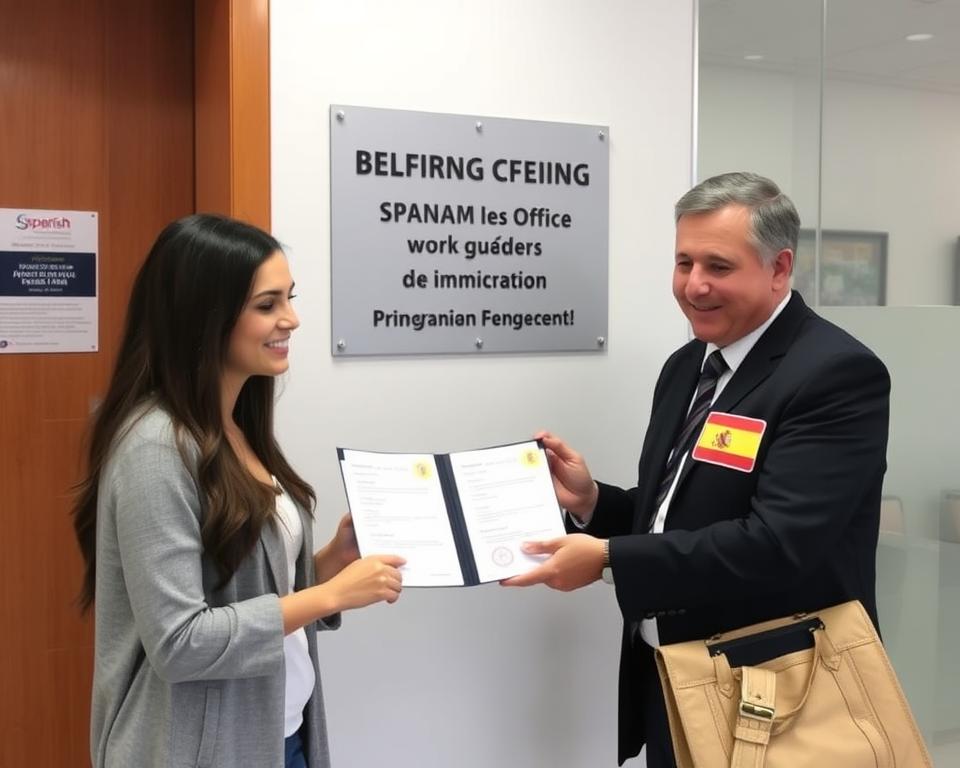
Work Permit Options
There are several work permit pathways available to international graduates:
Standard Work Permit
For regular employment with a Spanish company.
- Requires a job offer from a Spanish employer
- Employer must prove no suitable EU candidates are available
- Valid for 1-2 years and renewable
Highly Skilled Professional Visa
For graduates with specialized skills or high-paying job offers.
- Requires a job offer with annual salary of at least €40,000
- Faster processing time (20 days)
- Includes family reunification benefits
Entrepreneur Visa
For graduates starting their own business in Spain.
- Requires a viable business plan
- Must demonstrate sufficient investment capital
- Initial duration of 1 year, renewable for 2-year periods
Permanent Residency and Citizenship
Long-term settlement options in Spain include:
- Long-term Residency: Available after 5 years of legal residency in Spain (student visa time counts as half)
- Permanent Residency: Available after 5 years of holding long-term residency
- Spanish Citizenship: Generally available after 10 years of legal residency (2 years for citizens of Latin American countries, Philippines, Equatorial Guinea, and Portugal)
Note: Time spent on a student visa counts as half-time toward the residency requirement for permanent residency and citizenship. For example, 4 years on a student visa counts as 2 years toward the 5-year requirement for long-term residency.
Planning your future in Spain?
Download our comprehensive guide to post-study options and settlement pathways in Spain to make informed decisions about your future.
Case Studies: International Student Experiences
Maria from Brazil

Program: Master’s in International Business at University of Barcelona
Visa Process: Applied at Spanish Consulate in São Paulo. Faced initial challenges with financial documentation but resolved by providing additional bank statements.
Funding: Received Carolina Foundation Scholarship covering 60% of tuition and worked part-time as an English tutor.
Outcome: Secured a job with a multinational company in Barcelona using the job search visa and later obtained a highly skilled professional permit.
Ahmed from Egypt

Program: Bachelor’s in Computer Science at Complutense University of Madrid
Visa Process: Applied at Spanish Embassy in Cairo. Experienced delays due to document translation issues but received visa after 6 weeks.
Funding: Family sponsorship for first year, then secured university scholarship based on academic performance.
Outcome: Started a tech startup during his studies and successfully applied for an entrepreneur visa after graduation.
Priya from India

Program: PhD in Biotechnology at University of Valencia
Visa Process: Applied at Spanish Consulate in New Delhi. Smooth process with complete documentation, visa approved in 3 weeks.
Funding: Full MAEC-AECID scholarship covering tuition, accommodation, and monthly stipend.
Outcome: Completed PhD and secured a research position at a Spanish biotech company through the highly skilled professional pathway.
Frequently Asked Questions About Spain Study Visa
Can I extend my Spain student visa if my course duration increases?
Yes, you can extend your student visa if your study program is extended or if you decide to pursue further education. You should apply for the extension 60 days before your current visa expires. You’ll need to provide proof of continued enrollment, academic progress, sufficient financial means, and valid health insurance. The extension application is submitted at the local immigration office (Extranjería) in Spain.
Can my family members join me in Spain while I’m studying?
Yes, family members (spouse/partner and children under 18) can join you in Spain if you meet certain conditions. You must have been residing in Spain for at least six months on your student visa, have renewed or be in the process of renewing your visa for at least one more year, and demonstrate sufficient financial means to support your family (additional 75% of IPREM for the first family member and 50% for each subsequent member). Family members will receive a residence permit tied to your student visa but without automatic work authorization.
What happens if my Spain student visa application is rejected?
If your Spain student visa application is rejected, you will receive a written notification explaining the reasons for the rejection. Common reasons include incomplete documentation, insufficient financial means, or concerns about your intention to return to your home country. You have two options: appeal the decision within one month or address the issues and submit a new application. For appeals, you’ll need to provide additional documentation addressing the specific reasons for rejection. Consulting with an immigration lawyer can be helpful in these situations.
Can I travel to other Schengen countries with a Spain student visa?
Yes, a Spain student visa (Type D) allows you to travel within the Schengen Area for up to 90 days within any 180-day period. This means you can visit other Schengen countries for short trips, tourism, or academic conferences without obtaining additional visas. However, your primary place of residence must remain Spain, and you must comply with your study obligations. For longer stays in other Schengen countries, you would need to apply for the appropriate visa for that specific country.
How does the TIE (Foreigner Identity Card) differ from the student visa?
The student visa is the initial authorization that allows you to enter Spain for study purposes, while the TIE (Tarjeta de Identidad de Extranjero) is the physical residence card you obtain after arriving in Spain. The visa is typically valid for 90 days to allow you to enter Spain, while the TIE becomes your official identification document for the duration of your studies. The TIE contains your NIE (Foreigner Identification Number), which you’ll need for many administrative procedures in Spain, such as opening a bank account, signing a rental contract, or registering for healthcare. You must apply for the TIE within 30 days of arriving in Spain if your study program exceeds 180 days.
Conclusion: Your Journey to Studying in Spain
Embarking on your educational journey in Spain offers not only academic excellence but also a rich cultural experience in one of Europe’s most vibrant countries. From the initial university application to obtaining your student visa, and from finding scholarships to exploring post-study opportunities, this Spain Study Visa Guide has covered all essential aspects of studying in Spain as an international student.
Remember that preparation and thorough documentation are key to a successful visa application. Start your planning early, research your options thoroughly, and don’t hesitate to seek assistance when needed. With the right preparation, your dream of studying in Spain can become a reality, opening doors to new opportunities, experiences, and potential career pathways in Europe.
Ready to start your Spanish education journey?
Download our comprehensive Spain Study Abroad Guide with checklists, templates, and step-by-step instructions to make your transition smooth and successful.

